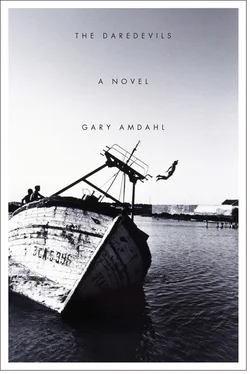Vera sobbed, mostly for Warren, whom she had loved, for what seemed like days and nights, then laughed for days and nights, and finally settled into a routine of sudden laughter and sudden weeping. To live was to suffer, she would say earnestly in between these fits: there was no getting around it, and she had always known it. Now perhaps she could articulate it for herself and stop worrying about it. Suffering was not merely central to life, it was essential. Suffering did not happen to life, it was life. She did not like to equate evil with suffering, or suffering with darkness, because evil was an effect of suffering, not a cause and because darkness was often a great solace — it was one of the reasons why she had always cherished a secret love of the theater — but the idea of a life as a point of light falling into darkness was the easiest way to put it. Life was a kind of ignorance of something real but insensible and unreachable — and how could one fail to be ignorant of that sort of reality! Well, however one managed it, one was not ignorant. One saw life for what it was, a kind of sleep, a drunkenness, an entanglement in the senses and emotions and consciousness, an entanglement in limbs that secreted a poison or a drug that numbed and addled and made one homesick. for the place or the condition or whatever you wanted to call it where people did not go to the theater to throw bombs on the stage, where the guilty did not put the innocent in prisons to rot or be hung, where children. oh, she could not bear to think of it. But it was where the moth would go to the light and not be destroyed, but rather become the fire.
Charles traveled often that winter and was often delayed by snowfall, but never buried alive. Vera often traveled with him, sometimes on business of her own — she met regularly and frequently a speaker from the NPL named Daisy Gluek — sometimes not, and they went at each other vigorously on these trips, because sex was one of the only activities available to persons bound in suffering and drugged with visions of home, performing “the act” here, there, and everywhere, sometimes with mouths locked together, swallowing all sounds but a muffled hooting, other times crying out as if for salvation from a god neither believed in, Charles duck-walking with pants and long johns around his ankles, Vera climbing aboard as she might a train whistling its departure. They went for long, numbingly cold walks between blizzards that only seemed to refresh and invigorate them. They kissed each other’s cold red cheeks and panted hot moist air into each other’s mouth. Charles begged her to marry him, and she begged him to stop asking her.
He went mainly to bakeries and the offices of commercial fishing operations, some dairies and bars, as well, as the state had put several food programs in motion that were perceived to be vulnerable to abuse by one radical group or another. One called for licensed agents of the state to catch rough fish — carp, dogfish, redhorse, mooneye, suckers, sheepshead, etc. — that would be marketed at state stores with a profit margin of no more than 3 percent, which meant both a steady supply of fish for strapped consumers at about half the usual market price, and a steady profit for the state — plowed, he believed and had tacitly confirmed, into the purchase of rifles and ammunition for a new “Home Guard.” Commercial fishermen felt pinched, however, and Charles’s job was to interview them, to measure their level of hostility, and listen carefully for tips about what that hostility might drive them to do. Milk producers were presented with a fixed price per quart that they could charge Twin Cities wholesalers, and told they must lay open their books.
In the far north, where the temperature regularly dropped to thirty and even forty and once fifty below—“It’s no colder tonight,” he was told in the town of Tower, “at the Arctic Circle than it is right here!”—he interviewed saloonkeepers: though the region, due to “county option” and various Indian treaties, was virtually saloon-free, enormous amounts of liquor were nevertheless being shipped in — ostensibly to individual consumers — via a loophole.
Vis-à-vis bread, the big millers were judged to be reasonable in their pricing, while small bakers were making out like Mexican banditos. These bakers protested while the millers clucked in feigned dismay. Charles interviewed bakers by the dozen. Many insisted the war effort was a hoax, but he winked and lifted the pen ostentatiously from his notebook for the length of these remarks.
And it was, in those moments, that he began to understand what he was doing.
He was heeding a secret, nascent impulse. He saw that he could act cleanly, without recourse to questions of personal prosperity. He saw that he could in effect trust himself, and that he should trust himself. He was not insane. He was not the aristocratic man of privilege gone nihilistic, not the practical Platonic republican driven into psychic exile by catastrophe and the emptiness of philosophy. Nor was he a man of peace, a soulful man: he was at war with the vastness of petty falsehood and needless suffering. He was no longer divided in himself, self against self, by fear and contempt of fear. He did not know how he had come to it, but come to it he had. He was not a radical, certainly not an anarchist, at least as its advocates described it. He had no genuine interest in the rights of the workingman, in labor reform, in racial equality, in progressive politics.
Or did he? He took it back: he had an interest, but not a personal interest in those things. He had no agenda to advance, put it that way, no cause to espouse, no principle to maintain, no belief to kill or die for. He had no wish to make people repent and therefore had no desire to put bullets in their heads. He was perhaps an anarchist in the way that Vera possibly was an anarchist: that is to say, she was not. Not really. If she had ever called herself one he had not heard it. They were not divided in their selves: that he could say. They were not afraid: that too he could say. No one is ruling? Then all are ruling. And if all are ruling — if all are letting all rule — then that rule “speaks the truth” because there’s no call for a deception; that rule is “just, generous, hospitable, temperate, scornful of petty calculations, scornful of being scorned.” Oh yes, he had read Emerson, to be sure, but he had not come near an understanding of him: he seemed to think himself an idealist and immediately admit that idealists were especially subject to cant and pretension and lofty ineffectuality, that rather than having Truth, Goodness, and Beauty inhering in each other, Beauty was supreme. Charles had no interest in Beauty because, before Vera, it had seemed false. Father despised Emerson — despised New England, really, and everything it stood for — and so, he supposed, had he despised him as part of his intellectual inheritance. “Our virtue trips and totters!” He had said so himself! “It does not yet walk firmly. Its representatives are austere; they preach and denounce; their rectitude is not yet a grace. They are still liable to that slight taint of burlesque which, in our strange world, attaches to the zealot.” Like Plato it was always correct to praise or despise him, but something of a sin to understand him. Charles had come to want to understand these great men. And he came to understandings so quickly and surely that he was almost ashamed of his body, that thing that could be so quickly and easily replaced, so quickly and surely that he had to have been helped, by his strange friends, the daredevils. I learned how to do a thing without a wish for reward or a fear of consequences. It gave him enormous energy. He felt whole and uncomplicated. He felt he was part of an uncomplicated whole. He felt that when conditions were sufficient for manifestation, he would manifest, and when they were not, he would not. The universe had come together to make me. It expected nothing of him but to be. He was free. And it was precisely when he found himself lifting the pen from his notebook and in effect winking at the baker who declared the war effort to be a hoax — a declaration that I now knew was against the law, was seditious, and punishable by imprisonment if he was lucky and lynching if he was not —that he knew he was free. He smiled inwardly to think that he was a hero. That he had found a way to become a hero. He could do whatever small task presented itself to be done: instead of calculating reward and consequence, he could lift his pen from his notebook. He cared one day, one hour, about nothing beyond seeing to it that the baker not be harassed and tortured. The next minute, hour, day, he would perform another brief act that might forestall cowardice and cruelty. That was all. It was so simple, so clear, so fine.
Читать дальше












